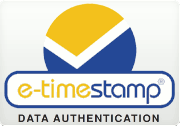FAQ - How to copyright and protect from copyright infringement
A directory of FAQ's on other timestamp subjects is here.
To see our product offering for copyright protection, click here.
Under the Berne Convention for the Protection of Literary and Artistic Works, signed by 167 countries, all works are automatically protected from the moment they are created. This protection requires proof of creation; you must be able to prove that your work originated with you. Proving you had your work at the time of creation, before anyone in the world has seen it yet, is that proof. A trusted digital timestamp provides significant evidence for the creator.
The U.S. Federal government's thoughts on this subject are available here.
"Ownership" involves binding a person's identity and their content into the digital timestamp. A timestamp proves that your creative work existed at a point-in-time. We recommend the creator include their name in/on their work so that it is timestamped with your work. Consider if someone steals the music or art and the timestamp, by possession of these two things, does the thief prove it is theirs?
Our recommendations for binding your name to your work are available here.
No, we do not need to see your work; you keep a copy of it and the digital timestamp. You retain complete confidentiality. Only the file's digital fingerprint is sent over the Internet. From the fingerprint, it is not possible to discover the contents of your file. More details here.
This protection remains throughout the creator's life plus 70 years. More information here.
No, a digital timestamp of your work serves as proof of your copyright. In the U.S., your work is automatically protected by copyright law from the moment of its creation. It is important to note that this protection is given without obtaining a registered copyright. Official registration may be made at any time within the life of the copyright.
An official copyright registration (submit 2 copies of your work and $35 fee) is required if you need to bring a lawsuit for infringement in the U.S.
Protection against unauthorized use in a particular country depends on the national laws of that country. However, most countries offer protection to foreign works under certain conditions that have been greatly simplified by international copyright treaties and conventions. See more information here about EU Copyright or here about US Copyright.

